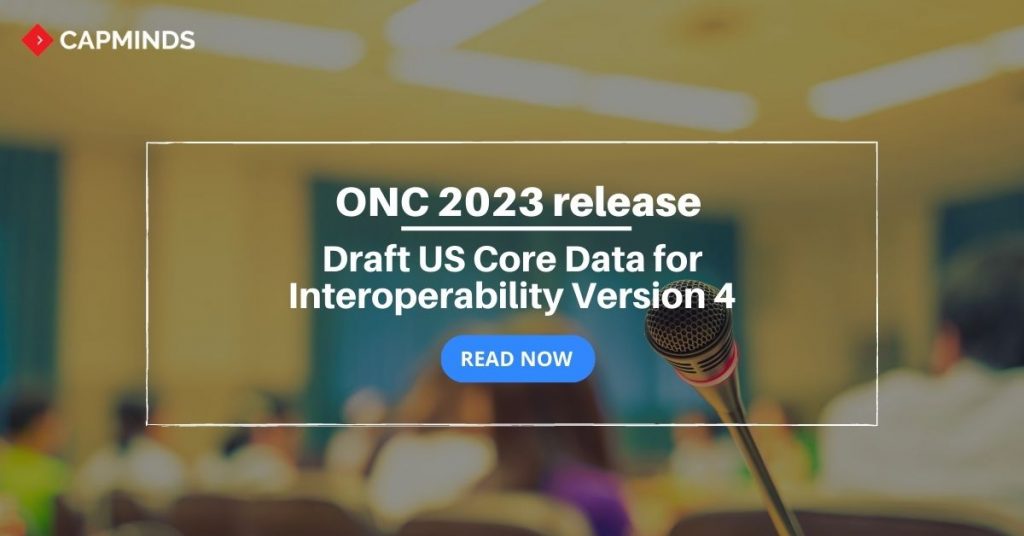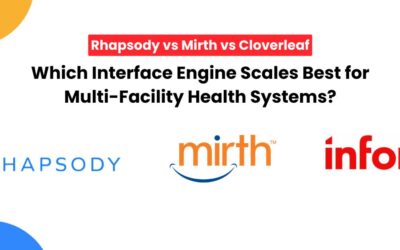Draft US Core Data for Interoperability Version 4: ONC’s latest release
ONC in January 2023 released the United States Core Data for Interoperability (USCDI) Draft Version 4. It also motivates the public to comment on the USCDI V4 till the 17th of April, 2023, 11:59 pm ET.
The feedback is accepted on the main Draft USCDI v4 page or individual data class or data element pages. It will consider the recommendations and comments while putting together the final USCDI version 4 for publication in July 2023.
What is the United States Core Data for Interoperability (USCDI)?
The United States Core Data for Interoperability (USCDI) is a standardized set of health data classes and constituent data elements for nationwide interoperable health information exchange (HIE).
It set up a standard set of data that can be often exchanged across healthcare systems for a variety of uses.
Version 1 (USCDI v1) was acquired as a standard in the 21st Century Cures Act: Interoperability, Information Blocking, and the ONC Health IT Certification Program Final Rule (Cures Act Final Rule) (at 45 CFR 170.213).
It was incorporated as an essential part of certain criteria and, consequently, certified health IT should be able to exchange USCDI data elements.
RELATED: Case Study: Improving Clinical Operations with CapMinds Health-tech Solutions
How is the USCDI organized?
The USCDI is organized by data elements and data classes.
- USCDI data elements: These mean concepts that can be utilized and exchanged as required.
- The element is a bit of data interpreted for the access, exchange, or use of electronic health information.
- A data element’s usage isn’t obligated by its data class title.
- USCDI data classes: These group data elements by a common theme.
- It is a collection of data elements based on a common theme or use case.
- A data class title doesn’t state the workflow where the data elements are collected and used.
RELATED: Interoperability & Healthcare Data Standards: The HL7’ hottest combination
What’s in the Draft US Core Data for Interoperability Version 4?
The draft put forward to add 20 data elements across a new data class and 8 existing data classes.
- The new data class- “Facility Information” includes the data elements facility identifier, facility type, and facility name.
If this comes into motion, the USCDI version 4 will have 112 data elements organized in 19 data classes.
The expansion of USCDI was established by ONC on public evaluation of the previous versions and submission by the health IT community. When the submission process ended in September 2022, ONC evaluated new submissions provided through the ONC New Data Element and Class (ONDEC) system. They also evaluated recommendations on data elements acquired from previous cycles.
It approximately received 148 submissions for new data elements and 345 comments on previously submitted data elements. It also applied the following prioritization criteria to create the final list of proposed new data elements for Draft USCDI version 4.
The Prioritization Criteria of ONC to include data elements in the USCDI version 4
- Represent significant additions over previous USCDI versions
- Address the needs of underserved communities
- Alleviate health and healthcare inequities and disparities
- Requisite only modest standards or implementation guide developmental burden
- Address behavioral health integration with primary care and other physical care
- Address public health interoperability needs of reporting, investigation, and emergency response
- Result in the only modest aggregate lift for all new data elements combined
- Requisite only a modest developmental burden on health IT modules
- Create only a modest implementation burden on providers and health systems
The Descriptions of the Release
- ONC encourages the public to go through the Draft and provide comments on data classes and elements to include them in the final USCDI version 4.
- It also emphasizes the community to give feedback on improvements in data classes or elements incorporated in Draft USCDI version 4.
- It asks if data elements classified as Level 2 should be attached to USCDI v4 instead or in addition to those in Draft USCDI v4.
- It asks for feedback on if there are any challenges to the development, implementation, or utilization of any of these data elements that mandate any change in definition or deletion from Draft USCDI v4.
- As we said earlier at the start, the ONC encourages the public to comment on the USCDI V4 till the 17th of April, 2023, 11:59 pm ET.
- The feedback is accepted on the main Draft USCDI v4 page or individual data class or data element pages.
- It will consider the recommendations and comments while putting together the final USCDI version 4 for publication in July 2023.
- Once they finalize USCDI v4, the ONC will think about its incorporation in a future Standards Version Advancement Process (SVAP) cycle. This allows EHR vendors to update their certified health IT by choice with new USCDI data elements.
Digital Health Tech Services from CapMinds
CapMinds Technology is a leading healthcare IT software, solutions, and service provider for practices in the most sensitive and vast healthcare continuum.
Our sharp-cut innovations and automated technologies allow every healthcare aspect to be patient-centric for delivering improved quality care and deriving positive organizational & patient outcomes. Double your practice revenue with our cloud-based EHR, RPA, and other healthcare solutions and services. Our high-grade compliance & security measures build the perfect digital trust for you.
Our futuristic smart innovative digital health techs enable clinicians and healthcare organizations to touch the peaks by transforming processes to automation. This gives you better documentation & advanced health interoperability. The doubled security through HIPAA and regulations will derive client satisfaction and deliver better care for your practice. This breaks barriers to your digital growth.
“Excel in Health IT with us through our compliance & certification services”




